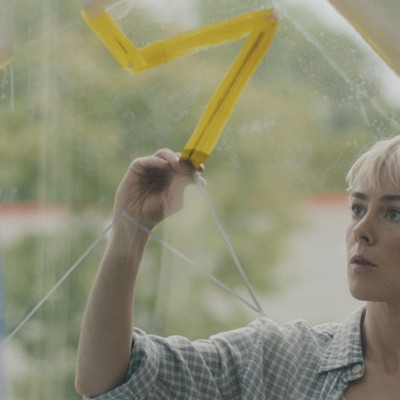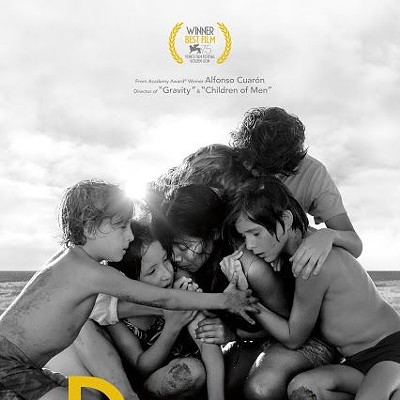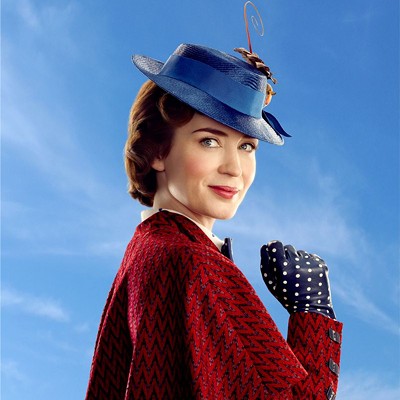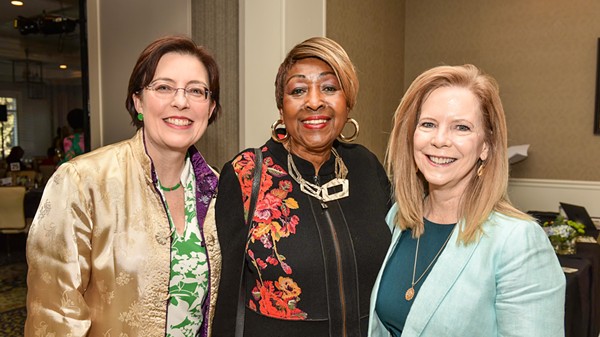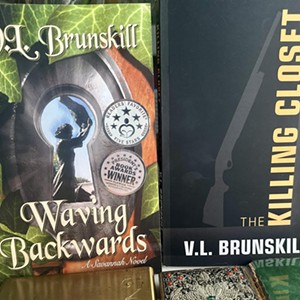BECOMING JANE Perfectly pleasant yet also somewhat pointless, Becoming Jane comes across less as a motion picture and more as a victim of identity theft. Given the glut of exemplary films based on the works of Austen -- from the fairly faithful (Sense and Sensibility, Pride and Prejudice) to the radically reworked (Bridget Jones’s Diary, Clueless) -- the only sound reasons to create a movie based on Jane herself would be either to suggest some insights into what turned this country girl into one of the most acclaimed writers in the English language or to provide a comprehensive overview of her life and times. But Becoming Jane prefers to take a more narrow view, focusing on one small period in her life (and, based on historical records, a spotty one at that) and trumping up the details of her brief flirtation with a dashing rogue named Tom Lefroy. As a result, the Jane in this film never feels real, ultimately coming across as fictional a creation as Elizabeth Bennet or Elinor Dashwood or any other Austen heroine. Still, within its own self-contained chamber, it’s an agreeable period romp, missing the spark of the high-end Austen adaptations but firmly in command of its own romantic devices. Anne Hathaway, all-American in The Devil Wears Prada and Brokeback Mountain, adopts a British accent and makes for a lively Jane, while James McAvoy (The Last King of Scotland) brings the proper measure of rakish charm to the part of Lefroy. It all goes down smoothly, and if the incomplete portrait of Jane Austen sends even one person to the library to hunt down more info, so much the better. **1/2
THE BOURNE ULTIMATUM The third time’s the charm with The Bourne Ultimatum, the best in the series of films based on the Robert Ludlum novels. Admittedly, I wasn’t as great a fan as everyone else when it came to the first two entries in the series, 2002’s The Bourne Identity and 2004’s The Bourne Supremacy. While I appreciated the films’ efforts to bring the spy flick back to its gritty and less gadget-oriented roots (an approach better accomplished by last year’s James Bond reinvention, Casino Royale), both Identity (directed by Doug Liman) and Supremacy (helmed by Paul Greengrass) felt as if they were constantly getting stuck in the same grooves, with repetitive action sequences, a squandering of great talent in throwaway roles, and a tight-lipped protagonist so one-note that viewer empathy was next to impossible. These problems haven’t all been rectified in Ultimatum, but they don’t nag as consistently as before. Matt Damon, suitably taciturn even though he’s still too young for the role, again stars as Jason Bourne, the former CIA assassin whose continuing bout of amnesia regarding his past perpetually keeps him searching for the truth, even as his agency handlers seek to have him terminated. Greengrass, returning to the series after taking time off to earn a Best Director Oscar nomination for United 93, tops himself with action set pieces that prove to be more exciting than those on display in his Supremacy (or Liman’s Identity). One of the lengthy chase scenes is especially impressive, and makes one wonder if Damon elected to forego a straight salary in order to be paid by the kilometer. *** HAIRSPRAY A testing of the mainstream waters, maverick moviemaker John Waters’ 1988 Hairspray was a critical hit that was eventually turned into a Broadway musical before now being brought back to the screen. A similar screen-to-stage-to-screen journey didn’t help The Producers, but here’s betting that Hairspray meets with more success. It’s one of this summer’s few out-and-out delights, smoothing out but never compromising the themes that made Waters’ film such a quirky delight. An ode to being different, Hairspray, set in 1960s Baltimore, stars delightful newcomer Nikki Blonsky as Tracy Turnblad, an overweight teenager who won’t let her pleasantly plump figure get in the way of following her dream to dance. The film’s hot-topic issues (including racism) are presented in the realm of feel-good fantasy, meaning that reality has no place in this particular picture. It’s first and foremost a musical, and director Adam Shankman does a commendable job of filming the song-and-dance routines in a manner that accentuates the total skills involved (the noticeable lack of rapid MTV-style cuts is greatly appreciated). All of the principals are allowed to belt out at least one number apiece, and their enthusiasm and energy is positively infectious. The weakest cast link is, perhaps surprisingly, John Travolta (in drag as Tracy’s plump mom), who fails to adequately fill the large shoes of the late Divine, who was simply, well, divine in Waters’ original screen version. As for John Waters, he stuck around to make sure that the circle’s complete. Look for him in a split-second cameo at the beginning: He’s the pervert who flashes a trio of housewives on the street. ***1/2 HARRY POTTER AND THE ORDER OF THE PHOENIX Those who like their Potter black will find much to appreciate in the fifth and moodiest of the J.K. Rowling adaptations to date. Chris Columbus’ first two entries focused mainly on fun and games, with the subsequent installments helmed by Alfonso Cuaron and Mike Newell taking on decidedly darker dimensions. The level of malevolence is raised even further here, thanks to the taut direction by unknown David Yates and a forceful performance by series lead Daniel Radcliffe. Villainy abounds in Phoenix, with Lord Voldemort (Ralph Fiennes) haunting Harry’s every move, a fluttering fascist named Dolores Umbridge (Imelda Staunton) taking over the Hogwarts school, and an escaped prisoner known as Bellatrix Lestrange (Helena Bonham Carter) arriving late to kill off a popular character. Add to those threats Harry’s issues of abandonment and estrangement, and it’s no wonder the lad can’t keep those roiling emotions in check. In this respect, Phoenix operates not only as a story-specific fantasy flick but also as a universal teen angst tale, a far-flung Rebel Without a Cause in which the protagonist tries to comprehend the adult world he’s on the verge of entering while simultaneously struggling to cut the umbilical cord of childhood. In many ways, the film echoes The Empire Strikes Back: The mood is grim, the heroes are reeling, and the villains are on the move. But with a little help from their friends, not to mention a strong belief in the “force” of good, these kids may yet save the day. *** I NOW PRONOUNCE YOU CHUCK & LARRY Adam Sandler comedies frequently offer sequences that qualify as case studies in homophobia, so here comes this film to serve as the comedian’s mea culpa, his belated realization that, hey, gays are people, too. That’s a worthy sentiment, and the screenplay by Barry Fanaro (TV’s The Golden Girls) and the Oscar-winning team of Alexander Payne and Jim Taylor (Sideways) often examines that notion rather than just paying lip service to a PC attitude. In short, there’s a good movie to be found in the premise of two firemen (Sandler and Kevin James) pretending to be life partners for financial purposes, but it’s repeatedly sabotaged by the desire to placate typical Sandler fans who wouldn’t want their boy to get too, you know, fruity on them. Thus, the movie opens with the promise of an open-mouth kiss between buxom twin sisters, peaks with the sight of Jessica Biel in a Catwoman outfit, and ends with the protagonists happily paired off in hetero unions. In addition to this confirmation of the movie’s straight-man cred, there are also the usual frat-boy gags involving flatulence, obesity and racial stereotypes, as well as the added treat of Dan Aykroyd (as the fire chief) discussing his sole remaining testicle. That’s probably too much crassness for one seemingly noble-minded comedy to survive, and this one goes down swinging. But in its best moments, it reveals that the 40-year-old Sandler might finally be growing up. Give him another four decades, and who knows what mature piece he might produce on his way to the cemetery. ** LICENSE TO WED The heir presumptive to last summer’s You, Me and Dupree, this toxic-waste comedy, offensive in its idiocy, similarly places loathsome characters in absurd situations that are meant to give off a funky black-comedy vibe yet instead reek only of desperation as well as the limitations of comically challenged minds. Under the disinterested supervision of director Ken Kwapis, four writers (four?!) jerry-build a premise that finds newly engaged couple Ben Murphy (John Krasinski) and Sadie Jones (Mandy Moore) forced to pass a marriage preparation course supervised by the Jones family’s longtime minister, Reverend Frank (Robin Williams). Along the way, Reverend Frank, aided by his young apprentice (Josh Flitter, as annoying here as he was in Nancy Drew), bugs the couple’s bedroom, embarrasses Ben in front of his future in-laws, and drives Sadie away from her fiance. Sharp scripting could have given Frank the balance required to make him an apt comic foil, but here he’s simply creepy, a problem expounded by the casting of Robin Williams. Williams is in his manic, whoring mode here, an approach well past its expiration date in terms of actually resembling anything funny or topical. (One bit finds Williams making a joke about O.J. Simpson; heck, why not cracks about the Pentagon Papers or Rosie the Riveter or even the invention of the light bulb?) Williams has made so many one-star comedies that it’s impossible to keep count at this point. But rest assured that there’s a multiplex in hell that screens them on a perpetual loop. *
NO RESERVATIONS As far as culinary treats go, patrons can’t do better this summer than Ratatouille. But whereas that Pixar gem is the filmic equivalent of an entree, think of this pleasant time-filler as a particularly palatable side dish. Movie-star wattage counts for a lot in No Reservations, and both Catherine Zeta-Jones and Aaron Eckhart burn brightly, both individually and in their shared scenes. She’s Kate, a workaholic chef whose life gets upturned when her sister’s fatal car crash leaves her in charge of her precocious niece Zoe (Little Miss Sunshine’s Abigail Breslin). He’s Nick, a sous chef who takes a position under Kate at a posh restaurant and quickly finds himself drawn to this tempestuous woman who considers herself the finest chef in all of New York and physically confronts customers who dare complain about her dishes. A frothy confection on the surface, No Reservations, based on the 2001 German film Mostly Martha, spends a great deal of time on the painful loss experienced by Zoe as she comes to grips with the death of her mother. Mostly, though, the movie functions as a charming romantic comedy, one bolstered by the crisp camerawork by Stuart Dryburgh (The Piano) and especially the richly textured music by Philip Glass (The Hours), whose score is so grandiose and award-worthy that it occasionally threatens to overwhelm the small picture it’s serving. *** RATATOUILLE Cinema has given us so many marvelous movies set around the kitchen that it’s easy to lose count among the tantalizing dishes laid out on display. But onto a long list that includes Babette’s Feast, Eat Drink Man Woman, and Like Water for Chocolate, I never expected to add an animated yarn about a culinary rat. Ratatouille (a pun-tastic title that also ends up playing a part in the proceedings) is the latest winner from Pixar, the animation outfit whose win-loss ratio has still managed to equal that of the ‘72 Miami Dolphins. That is to say, John Lasseter’s company has yet to produce a dud, and one can only wonder when (or if) this streak will end. The rat is Remy (voiced by Patton Oswalt), whose skills in the kitchen are exemplary, and the primary human protagonist is Linguini (Lou Romano), a skinny lad who possesses none of his late father’s superb culinary abilities. Since restaurant kitchens aren’t exactly rodent-friendly, and since circumstances force the singularly untalented Linguini to pass himself off as a master chef, the pair pool their resources to return a once-great Paris eatery, now struggling following the publication of a disastrous review by food critic Anton Ego (Peter O’Toole), back to its lofty position as one of France’s finest. Written and directed by Brad Bird (The Incredibles), Ratatouille serves as a love letter to Paris, a valentine to the fine art of cooking, and a gift to summer moviegoers. ***1/2 RESCUE DAWN With apologies to William Shakespeare, when director Werner Herzog makes a movie, there generally isn’t a method to his madness; instead, there’s madness in his method, a go-for-broke intensity that has informed most of this German maverick’s pictures, from his classics Aguirre: The Wrath of God and Fitzcarraldo to his recent (and excellent) documentary Grizzly Man. But that aggressive (insane?) edge is nowhere to be found in this fairly conventional drama inspired by a true story. Herzog already tackled the tale of Dieter Dengler in his 1997 doc Little Dieter Needs to Fly, yet here he provides it with a more fictional sheen. Dieter (Christian Bale) is a gung-ho U.S. navy pilot who, in the early days of the Vietnam War, is shot down over Laos and held in a makeshift POW camp along with two other Americans (Steve Zahn and Jeremy Davies). There are no political allegories or points of view, no fancy special effects, and, except during a curiously flat conclusion, no displays of sentimentality. This is simply a movie about a man at odds with his surroundings, and in that respect, it fits nicely into the Herzog oeuvre. What doesn’t fit so neatly is the feeling that, while Herzog has hardly sold out, he has tamed his inner filmmaking demons long enough to make a respectable movie that won’t ruffle any feathers during the summer film season. **1/2 THE SIMPSONS MOVIE Crafting a motion picture from a current television series that’s been around for nearly two decades is a dicey proposition (as has been pointed out, why pay for something you can get for free at home?), but The Simpsons Movie fills the larger dimensions of the theater screen quite nicely. Running the length of four combined episodes, this often hilarious flick takes Homer’s weekly display of idiocy to a new level, as his bumbling disrespect for the environment leads to Springfield being blocked off from the rest of the world by a giant dome, with the town’s destruction the ultimate goal of the overzealous head of the Environmental Protection Agency (voiced by Albert Brooks, billed in the credits as “A. Brooks”). Knowing that Homer is the culprit, the town’s residents soon come a-calling with torches in hand and nooses hanging from nearby trees. But if there’s one area in which Hollywood remains blissfully, even blessedly, optimistic, it’s in the strength of the family unit, and as long as Homer, Marge, Bart, Lisa and Maggie stick together, they can lick any and all odds. Yet in this outing, even that tried and true formula is put to the test, as Homer’s selfishness and cluelessness strains even the patience of Marge, perhaps the most devoted wife of a pigheaded TV character since Edith Bunker used to stand up for Archie back in the 1970s. Marge’s romantic crisis manages to be touching, as does do-gooder Lisa’s love for the progressive new kid on the block. But The Simpsons Movie is mainly about jokes -- old jokes, new jokes, topical jokes, risqué jokes, sight gags, perhaps even a non sequitor or two. ***1/2


